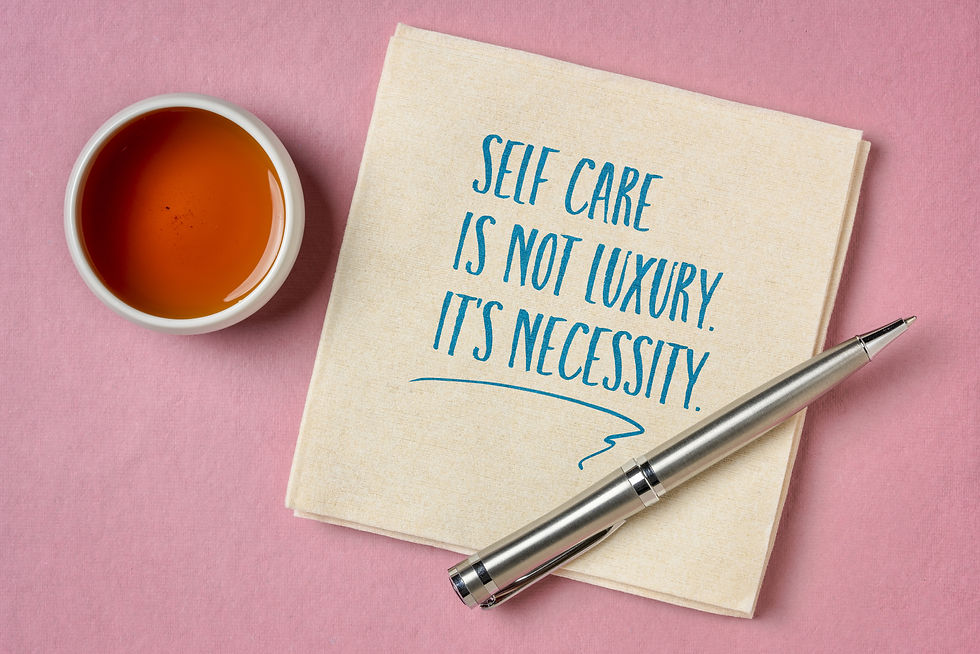Leaders Need Self-Care Too: It’s Okay, It’s Healthy, and It Should Be Celebrated
- Dr. Leatrice Brooks, LP

- Jul 6, 2022
- 4 min read
Updated: Jul 21, 2022

“You taking care of you is good for me” is what a team member said in response to my vacation announcement. I felt relieved. Deep down, I worried about how it would look to be out of the office for two weeks. Unfortunately, many of us have been socialized to believe leaders are not working hard unless they keep late hours, are exhausted, stressed, overrun, stretched beyond reasonable limits, and always working. While we supposedly know that people perform best when they are well-rested and their needs are met, we continue with unhealthy patterns. My staff member further explained the personal impact of others not taking care of themselves. Sometimes in the haste to get things done, we forget about that part that impacts the people around us. We become so tunnel-visioned on the work that we lose sight of other things that are essential to our well-being, and the success and quality of the work.
As the COVID-19 pandemic morphs, we are still in a “reset” moment around work and home. Let's use this momentum to re-write the narrative and create a new rhythm around self-care, especially for leaders. There’s a lot of focus on meeting the needs of team members, and leaders deserve some attention too. We’ve repeatedly said that there is no “getting back to normal.” As we reshape the work landscape for staff, we can also do so for leaders. In re-claiming ourselves, we gain personal strength and make room to deepen relationships with staff, colleagues, family, friends, and the community, which are a vital part of the big picture.
What To Do
Self-care is about you. Period. “Self” is in the name, so do whatever you want. Choose things that give you energy and excitement just thinking about them. Sometimes we don’t know what to do because we haven’t practiced enough. Here’s where to start.
Make a cheat sheet list of things you like to do for self-care.
Get ideas from others about what they like to do and try something new.
Explore what’s happening in your community or surrounding areas.
How To Do It Your self-care time should be something strictly for self-care. Try to stay away from 2-for -1’s like bike riding for enjoyment and exercise. For example, I bike ride because I enjoy it, and it helps me reset to presence. I go to the gym (and take classes I enjoy) for exercise. Sometimes this feels tricky and challenging to do and commit to, but don’t short-change yourself. You deserve both.
Be intentional in honoring every category of needs. The PRESENCE Principles model can help you identify critical areas that should receive regular attention.
Self-care is most effective when it’s focused on you. That doesn’t mean you aren’t mindful of other people and things. It means permitting yourself to be present with yourself so you can refill your tank. With that purpose in mind, I intentionally do not process anything heavy. I think about and reflect on things that will energize me and make time for those other things later.
When To Do It Prioritize your self-care time and figure out how to make it happen weekly. Self-care should be built into your schedule and a must, not an afterthought. Put self-care on the calendar as you do everything else. Self-care doesn’t always take the form of vacation but should be a regular part of the self-care plan. Periodic long weekends are helpful too.
Set reminders or a weekly habit that will trigger you to schedule self-care.
Before each week begins, identify at least one self-care activity or time for the following week. I like to look at the week ahead on Thursdays to ensure self-care is accounted for. The closer I get to the next week, the harder it is for me to follow through if it’s not already in the plan. If life happens and there’s a conflict, reschedule, don’t cancel, even if that means moving other things around. You are a priority too.
As you move through the week, evaluate your needs. Sometimes they change and you need self-care sooner than anticipated. If so, add in another time. Get out of the habit of starting self-care when you’re exhausted. Think prevention.
Presence Leadership and Self-Care
As a leader, how do you schedule regular self-care without guilt and normalize it for others? Here’s what I’ve learned and observed – office culture and relationships are a huge factor. Expectations start from the top down. Establish and nourish a culture that expects, encourages, and values self-care. Healthy relationship-building with a team that functions as a community often supports self-care, even for leaders. It feels good to know that someone else cares about your well-being, which should be reciprocated throughout all team levels.
Call to Presence
Make the following commitments to yourself and map a plan to get results.
Prioritize yourself and know that you are better when you do.
Make a conscious decision not to feel guilty about self-care.
Establish healthy habits and give proper self-care a chance before discounting or concluding it can’t be done.
Presence is a learned skill and the Presence Formula can help you get there. Download the free guide to learn this repeatable 4 step process to increase your presence. You'll receive new blog posts right in your inbox. Contact us for a personalized Presence experience.
BE PRESENT,

Licensed Psychologist, Executive Coach, Speaker
Dr. Leatrice positions organizations to maximize productivity, master collaboration and teamwork,
and retain high achievers.
“Great Things Happen When You’re Present”
© 2022, Dr. Leatrice R. Brooks
e-mail: DrLeatrice@Drleatrice.com
web: www.DrLeatrice.com
phone: 269-389-9968



Comments